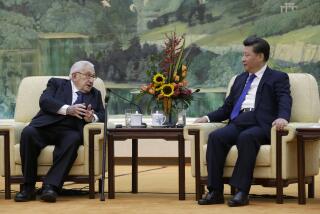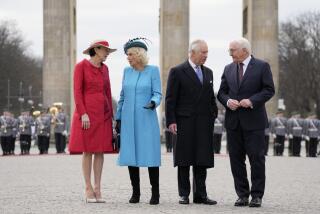Baker Vows Support for E. Germany : Diplomacy: Regime calls dramatic visit the start of a ‘dialogue.’ Reforms praised by secretary of state.
- Share via
POTSDAM, East Germany — Secretary of State James A. Baker III, in a dramatic gesture of approval for an embattled Communist regime, visited East Germany on Tuesday to tell Prime Minister Hans Modrow that the United States supports his reformist policies and will do what it can to make them succeed.
Talking to reporters after his hourlong meeting with Modrow, the first ever by a secretary of state with an East German government leader, Baker said his trip was intended to signal “our support for the reforms that are taking place in this country.”
Modrow, standing at Baker’s side, called the meeting “a good political sign that the U.S.A. follows developments in the D.D.R. (East Germany) with attention.” He said it was the start of “a dialogue that will lead to cooperation.”
Baker traveled by automobile across the Glienicke Bridge, traditional scene of East-West spy swaps, from West Berlin to Potsdam, the Berlin suburb where U.S. President Harry S. Truman, British Prime Minister Winston Churchill and Soviet dictator Josef Stalin hammered out the details of the occupation of Nazi Germany.
Although former Secretaries of State John Foster Dulles and William P. Rogers visited East Berlin, Baker became the first secretary of state to travel to East Germany outside the divided capital.
After his talks with Modrow and Foreign Minister Oskar Fischer in a tiny meeting room of the drab Interhotel Potsdam, Baker went to the 19th-Century Nikolai church to confer with East German Lutheran leaders who were among the leading critics of now-departed Communist leaders Erich Honicker and Egon Krenz.
A senior State Department official aboard Baker’s aircraft said later that the secretary of state originally rejected a proposed visit to East Germany. The official said Baker reconsidered after a late-night meeting Monday with Richard Barkley, U.S. ambassador to East Germany.
Barkley was understood to have told Baker that the chances for a peaceful transition from totalitarianism to democracy are better if Modrow’s regime survives.
A State Department official said the church leaders also told Baker that Modrow is their best hope for peaceful change. The official said the churchmen added that it was important for Modrow to receive recognition as a legitimate government leader.
Earlier in the day, Baker celebrated the crumbling of the Berlin Wall with a visit to Potsdamer Platz, once the heart of prewar Berlin, where workmen last month cut away a half-block-wide segment of the wall to permit easy travel from East to West.
“I am glad to see there are a lot of openings in the wall,” Baker said.
He stared at, but did not respond to, a handful of radical West German students chanting in a sing-song English: “Yankees out of El Salvador” and “U.S. out of Central America.”
Although it was all but overshadowed by his dramatic visits to East Germany and to the wall, Baker outlined the Bush Administration’s vision of the structures needed to overcome the postwar division of Europe and end centuries of animosity on the Continent.
In a speech to the West Berlin press club, Baker said that in Poland, Hungary, Czechoslovakia, Bulgaria and East Germany, the people “have freed themselves” by forcing profound changes in the Communist regimes that have dominated Eastern Europe for almost 45 years. But he said the dramatic changes have produced new challenges.
“Many of the guideposts that brought us security through four sometimes tense and threatening decades are now coming down,” he said. “Some of the divisive issues that once brought conflict to Europe are re-emerging.”
Baker emphasized that the United States intends to continue to play an active role in the evolution of post-Cold War Europe.
Most dramatically, he said Washington is determined to play an active role when the 12-nation European Community completes its scheduled economic integration in 1992.
“Americans will profit from access to a single European market, just as Europeans have long profited from their access to a single American market,” Baker said. “As Europe moves toward its goal of a common internal market . . . the link between the United States and the European Community will become even more important.
“We propose that the United States and the European Community work together to achieve, whether in treaty or some other form, a significantly strengthened set of institutional and consultative links.
“We suggest that our discussions about this idea proceed in parallel with Europe’s efforts to achieve by 1992 a common internal market so that plans for U.S.-EC interaction would evolve with changes in the community,” he said.
A State Department official explained that the United States does not hope to become “the 13th member of the EC.” But he said Washington does want regular meetings between the world’s largest economy and the world’s largest trading bloc.
Baker called for the North Atlantic Treaty Organization to develop a new, and primarily political, role in a Europe where the need for an alliance to deter Soviet aggression seems to have declined.
Baker also urged the Conference on Security and Cooperation in Europe, launched more than 14 years ago in Helsinki, to go beyond its earlier endorsement of human rights and declare that all people have the right to “free, regular, open, multi-party elections.”
“This is the ultimate human right, the right that secures all others,” Baker said. “Without free elections, no rights can be long guaranteed. With free elections, no rights can be long denied.”
Baker paid tribute to the Soviet Union under President Mikhail S. Gorbachev, which he said “has demonstrated a remarkable degree of realism” as its once-formidable empire has unraveled.
A State Department official said Baker informed the Soviet Union early Tuesday of his plan to visit East Germany. The official said Moscow expressed no objection.
The official said that West German Chancellor Helmut Kohl, who met Baker early Tuesday, also did not object to the trip, although it seemed designed to provide a new level of legitimacy to the East German regime, possibly slowing the pace of German reunification, a cause that is dear to Kohl’s heart.
The East German religious leaders told Baker that, in their opinion, reunification could be the “economic salvation” of East Germany by fusing it to its far more prosperous neighbor, a senior official told reporters aboard Baker’s plane.
The official said Baker replied that “it is entirely possible that economic reunification will take place de facto, in any event, even without . . . political reunification.”
That advice was consistent with a U.S. policy of urging a go-slow approach to unification.
The official said that Baker told both Modrow and the churchmen that if East Germany continues with its reforms, it might ultimately qualify for the sort of economic aid from the United States and other Western nations that has been offered to Poland and Hungary.
More to Read
Sign up for Essential California
The most important California stories and recommendations in your inbox every morning.
You may occasionally receive promotional content from the Los Angeles Times.













